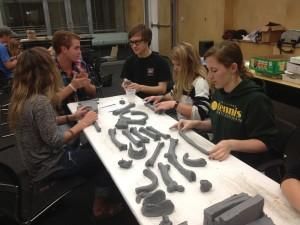No headline provided

One Million Bones, a nationwide movement uniting art and activism, is preparing to make its next statement in New Orleans with the help of Tulane students and the New Orleans community by creating a display of clay bones to represent the impact of genocide.
One Million Bones is an organization that began in 2010 Albuquerque, New Mexico. The group displays installations of bones made out of clay in order to raise awareness for acts of genocide taking place across the world.
The project’s founder and director Naomi Natale explained the importance of the organization.
“These mass conflicts with so little attention paid to them really provoked me to create a work that would allow other people to participate, perhaps find their voice, but also learn about these issues,” Natale said.
One Million Bones will host a performance in Congo Square in Armstrong Park April 7 during which 200 volunteers dressed in white will lay out of 50,000 clay bones. The event will feature speakers from genocide-stricken countries and City Councilmember Gisleson Palmer.
New Orleans is the second city to host a One Million Bones exhibition. The first took place in Albuquerque in August 2011.
“It’s a really emotional and powerful experience,” Natale said. “Everyone responds to it differently, but the majority of people who participated in that day [in Albuquerque] were really proud of their participation and really grateful for the experience. I hope that’s what people will also feel here in New Orleans.”
The group’s base in New Orleans relies on volunteers to make the bones and also needs volunteers to participate in laying out the bones the day of the performance.
Several Tulane students are involved in the process. Senior Leigh Durham has been working with One Million Bones since September 2011. She is now their outreach intern and volunteer coordinator.
“What’s special about One Million Bones is that rather than someone just standing there and talking to you about something, you’re doing something with your hands,” Durham said. “Making the shape of a human bone with your hands ties you to the project, and it becomes more real of an issue.”
Dominique Ranieri, a Core Team member of the Global Service League, organized a bone-making session at Tulane.
“The fact is that we don’t really realize what’s happening,” Ranieri said. “We don’t understand how many people have died and how many mass graves there are until we can see it physically right in front of us. That’s why this is such a great cause.”
Your donation will support the student journalists of Tulane University. Your contribution will allow us to purchase equipment and cover our annual website hosting costs.


